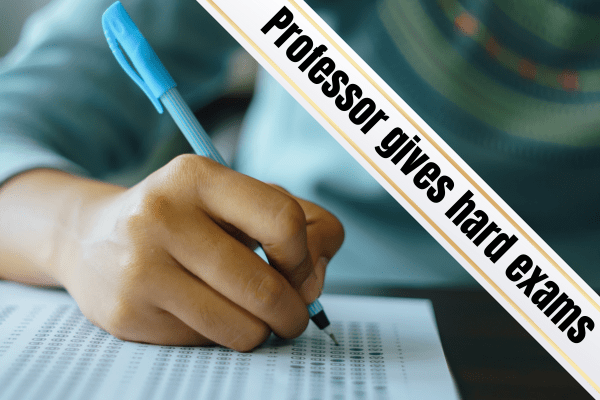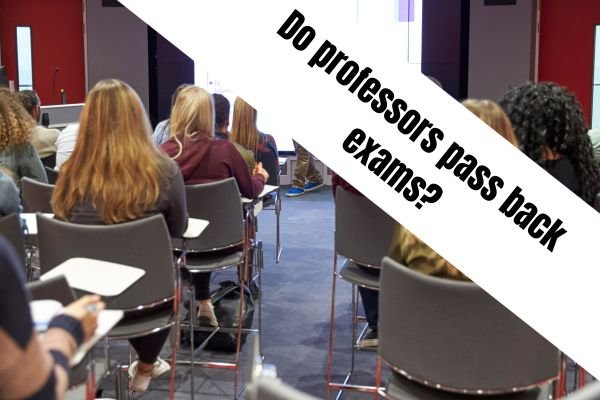Plagiarism and college : Students’ questions answered
About the author
Hi there. I am the prolific professor with 15 years of experience teaching online and in-person. I have a graduate degree. I have a passion for education. But I’ve also worked in the professional world (outside of education) too. Thanks for visiting.
FAQs : A college student’s guide for everything plagiarism
You find out that your professor is using a tool to check for plagiarism, and you start to panic.
Maybe you have plagiarized before.
Or you are worried that something will turn up as plagiarism, but you didn’t intend to plagiarize.
Now you’re paranoid.
And you’re looking for some answers.
I am going to explain how plagiarism checkers works, how professors use it, and what to expect.
I’ll give you some tips to help you avoid some of these common mistakes that students make that catch their professor’s attention and get them in trouble for plagiarism.
Then I will tell you how you can check your own paper for plagiarism.
As a professor, I have plenty of experience and knowledge about plagiarism.
What is plagiarism?
There are different types of plagiarism so it’s important to know how each type is defined.
Some students are surprised to learn that more than one type of plagiarism exists.
I see lots of students who plagiarize unknowingly so I am here to help explain plagiarism and how to avoid committing plagiarism.
Types of plagiarism
A student might use the entire contents of a paper and submit it as their own.
Pretend your friend took the same class last term, and the assignment didn’t change. You put your name on it and submit it as your own.
That’s plagiarism.
Or you take portions of writing from someone’s paper or online work without giving proper credit.
That is the type of plagiarism I see most often.
Other types of plagiarism could be you changing a few words here and there, trying to avoid detection.
But you can paraphrase and give proper credit to the author without committing plagiarism.
What happens if I plagiarize in college?
If you plagiarize, you could receive a failing grade, get a zero on the assignment, have a permanent mark on your transcript or get suspended or expelled from college. The penalties vary based on the institution, your professor’s policies and your previous infractions.
Universities will usually define plagiarism as a form of academic or scholastic dishonesty.
You should check your college’s student code of conduct or handbook to understand more about their definitions.
Most are elaborate to cover every type of plagiarism so that they can enforce their policies.
If you commit academic dishonesty, the college will likely have a process to find you responsible.
Now, if you are at a private university, then you may not have the same due process that students have at a public university.
Otherwise, when a professor suspects plagiarism, they turn it in to the appropriate office and wait on assigning a grade or giving a penalty to the student.
They give all the evidence to the investigating office.
The office reviews it, speaks with the student, and has a hearing, if applicable.
They make a decision and determine the appropriate penalty.
Usually, the professor will get to decide how the assignment is treated in their class, but the college may have additional penalties or requirements for the student beyond a grade.
Like an academic integrity seminar that the student must attend.
Usually you can appeal the decision, but not always.
That’s roughly how the process goes for most college students.
It’s best to avoid this so that you don’t have any permanent marks on your academic records.
Do professors always check for plagiarism?
No, not all professors will physically check a college student’s work for plagiarism, but it is very likely that a professor can tell if a student has plagiarized by their experience and using the student’s previous work for comparison.
A professor may be able to immediately detect plagiarism if they are very familiar with the work a student plagiarized from.
Or the professor may use a technological tool to search a paper for plagiarism.
Most colleges will pay for a license to use a website or tool that can detect plagiarism.
And most learning management programs (Canvas, Moodle, Blackboard, etc) may have these external tools available within the online classroom.
So even though you don’t have to submit your assignments directly to the plagiarism checker, just know it could be submitted through your online classroom when you upload it.
How does my professor check for plagiarism?
Most experienced professors can detect plagiarism when they read a student’s paper.
I have detected plagiarism without using any programs to do so.
I just have so much experience grading students’ papers, that I know what typical writing looks like for college students.
Plagiarized work stands out.
An example that might alert a professor that it’s plagiarized work is if a student has specific spellings of words that are not from the country the university is in like “color” v “colour” and the student hasn’t used the same spelling throughout the entire paper.
It might not always mean plagiarism though because the student might be from that country and use that spelling, however, if the paper contains various spellings of that same word, it might signal to the professor that’s it’s plagiarized.
So most of the time, it’s totally obvious.
Now how the professor proves it, that’s more tricky.
They need to have evidence to support their claim.
So, if I am reviewing work, and I just have an idea it is plagiarized, I could take a sentence or two and Google that phrase.
If results are populated, I review the article and I usually find more matches within that article.
But my work isn’t always that easy.
So instead of making things more complicated, most professors will use programs to help them detect plagiarism.
Like Turnitin.com or something similar.
Students typically upload their own assignments into a learning management system through their college, and it can run the paper through this external tool immediately.
The tool gives professors a similarity score (percentage) and then includes an originality report.
It shows all the matches.
PRO TIP : If you see your own similarity score, understand that it could be matching your bibliography and direct quotes too. Just understand that a professor can see individual percentages for matching sources and adjust the similarity score accordingly. So don’t fret about that.
Will plagiarism checkers know if I use my friend’s old essay?
Yes, if the paper was previously submitted to a plagiarism checker for review before and uploaded into a student repository, it will show a match. Or it might match for other outside sources because the original author heavily plagiarized themselves or got content from online.
I would NOT use a paper from another student, despite how tempting it can be.
I have had students use friend’s old assignments, and I get a perfect match.
As a professor, I can request more information from the professor who originally had their work submitted to Turnitin.com.
It usually doesn’t work out in the student’s favor.
How do professors know you plagiarized?
Professors often know students plagiarized just by reading their paper, but they need to provide some objective evidence to support their suspicions. The professor will likely use some type of artificial intelligence to find matches to other sources. They then cross reference the matched sources to your content to find plagiarism.
However, it isn’t all that straightforward. Sometimes students can change around just enough words, find synonyms, or use obscure sources to avoid detection.
But I usually caution students with this approach.
Why?
Because it will likely catch up to you.
I have had students who did this, and I thought this student’s paper was stellar. But when the same student did in-class written work, it just didn’t match his written content he submitted for assignments.
I started to scratch my head and wonder how this student can turn in such professional work but write this terribly in class.
And this prompted me to go through his written work with a fine-tooth comb.
And viola. I found it! Plagiarized work. The entire paper!
So even if this works for you for awhile, it probably won’t last forever.
Can I use the same paper from another course for a different class?
Yes and No. Some professors will allow students to use a previous research paper and submit it for their class, if it’s over the exact same topic. Or professors will allow a large percentage of the paper to be submitted for their research paper from a previous class, but not always. It may or may not be scholastic dishonesty at your college.
Before you use a paper from a previous class, or a large percentage of that work and copy it for another paper, make sure you ask that professor.
It may be considered scholastic dishonesty based on your school’s definitions.
If you get permission, I recommend written permission, keep it handy in case they forget and accuse you of plagiarizing.
Because if your paper was previously uploaded to Turnitin.com, and submitted to the student repository, it will come back as a match.
And it will look like you plagiarized.
And even if it can be proven that it was your original work, your professor or college may agree that it was a form of scholastic dishonesty, and you could get in trouble.
So check with your professor and check your college’s definition of scholastic dishonesty to make sure it’s not included.
Will my professor be able to detect plagiarism in hard copy or written work?
Yes. Sometimes professors can detect plagiarism because of their experience reviewing college students’ work and knowing the literature from their discipline. Professors can also upload the work into databases to review for plagiarism by using Optical Character Recognition software.
For this type of work, it is possible that a professor could re-type the entire paper and scan for matches themselves.
Or they could use an optical character recognition (OCR) tool to scan the image and convert it to machine-readable text.
So while unlikely, it is possible.
How can a student check for plagiarism ?
Well, this depends on your college.
Some colleges will allow students, through their institution, to login to Turnitin.com and check their similarity score and originality report themselves.
While others may not.
Check with your professor to learn about your options to see if something is provided or recommended.
Otherwise, there are some online tools that can check a student’s paper for plagiarism, but they may be limited.
For example, it won’t be able to scan a student repository for plagiarism like Turnitin.com can.
Here are my suggestions though.
Grammarly
Chegg
Scibbr
And remember, if you are checking your own paper for plagiarism, you should be cautious about the tool you select.
You don’t want it to keep your paper in their repository for future matching because it would match yours later.
What Turnitin.com similarity score is bad?
I almost always tell my students that any similarity score over 30% starts to make me concerned. And I always review that originality report further to look for plagiarism more carefully. But all similarity scores aren’t the same.
It doesn’t mean that plagiarism occurred in a paper with a 30% or higher similarity score, and it doesn’t mean plagiarism didn’t occur in a paper with less than 30% either, it’s just always been a good measurement for me to review further
How to avoid plagiarism
You want to make sure that you thoroughly paraphrase the information yourself and give them credit too.
I typically recommend that students read the article or book, put it aside, and then try to summarize it, in their own words, so plagiarism is less likely to occur.
When you are writing and have an open book next to your computer, it makes it harder to write that information in your own words.
It’s too tempting and easy to overlook plagiarism so ditch the books and sources after you read them, and start typing only when they’re out of sight.
Also, if you submit your own work to different professors, it might be defined as plagiarism, depending on your institution.
I would always suggest that you write an entirely new paper for each class, regardless of how similar it was to a previous paper.
Oftentimes I find students plagiarizing because they simply forgot to cite sources or use quotation marks appropriately.
It is important to remember that there are rules for citations, and you should check with your professor on which type of style they want you to follow. See the most commons citation styles below.
APA style
MLA style
Chicago style
And follow all those citation requirements.
Most of that information is online now and you can find out how to cite in-text and bibliography sources.
PRO TIP : Even if you paraphrase, you must cite your source in-text. There’s something called in-text citations that are important to learn for college.
Final Thoughts
Plagiarism can be a scary topic for students.
You have some students who are so concerned with plagiarizing, and are worried they’ll accidentally do this, that they fret the entire time they are writing their paper.
Other times, you have students who want to try and beat the system and find ways to avoid detection.
But after reading my article, you’ll realize that with advancing technology, it’s getting harder and harder to avoid detection.
And to be honest, you are really harming your education by creating a short-cut.
Instead, avoid plagiarism, learn the information, and do the work.
You’d be surprised how much more you’ll learn, and how many skills you’ll acquire by putting in the effort.
-
This completely depends on your college, but the first attempt is usually dealt with informally, but the second attempt has more consequences. You might have a permanent mark on your transcript, fail a class, or get kicked out of the college. But the college has a lot of discretion and none of that may happen.
-
If you get caught plagiarizing, I would recommend that you be honest and talk to your professor immediately. It is possible that you could handle it informally without an official report to your college. And learn exactly how to avoid doing it in the future.
-
This depends on your professor’s policy. They should outline what the consequences could be for a student who is caught plagiarizing. And if they report it to your college, you will have additional consequences. Most colleges will have more lenient consequences for the first offense like completing a seminar about plagiarizing. But your professor could give you a zero for the assignment, or even fail you.
-
It could benefit you to be honest about your plagiarism and explain why it happened. Did you do it because you procrastinated and had to rush to complete the assignment? Or did you do it because you were lazy and didn’t want to do the work? Whatever the reason, own up to it. And then I would complete some type of outside seminar or tutorial on understanding plagiarism so that you could prove that you are changing your ways.
OTHER POSTS YOU’LL LOVE








